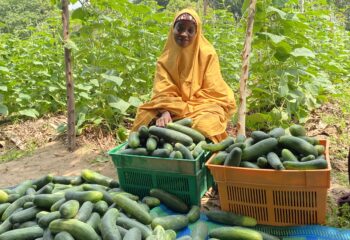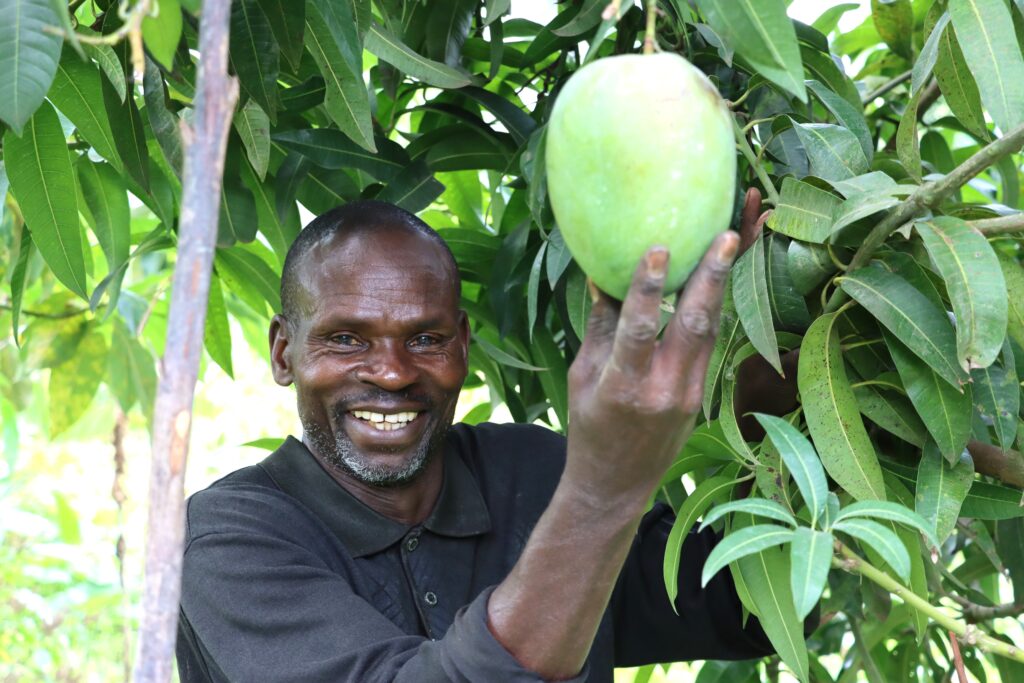
This World Food Day, BRIGHT honors farmers like Wilson and Margaret, who not only feed their own families but also enrich Uganda’s food basket.
Wilson Businge and Margaret Kahwa, along with their seven children, make up a vibrant farming household in Uganda’s Kabarole District. They grow bananas, cassava, coffee, and other vegetables and fruits on their two-acre plot, feeding their family and earning a living.
“Because we work together, our family is happy and motivated to achieve our vision.”
Wilson Businge
Like many rural Ugandan families, Wilson and Margaret grew up in farming households. When they started their life together, they naturally turned to agriculture, relying on traditional agricultural methods such as broadcast seeding.
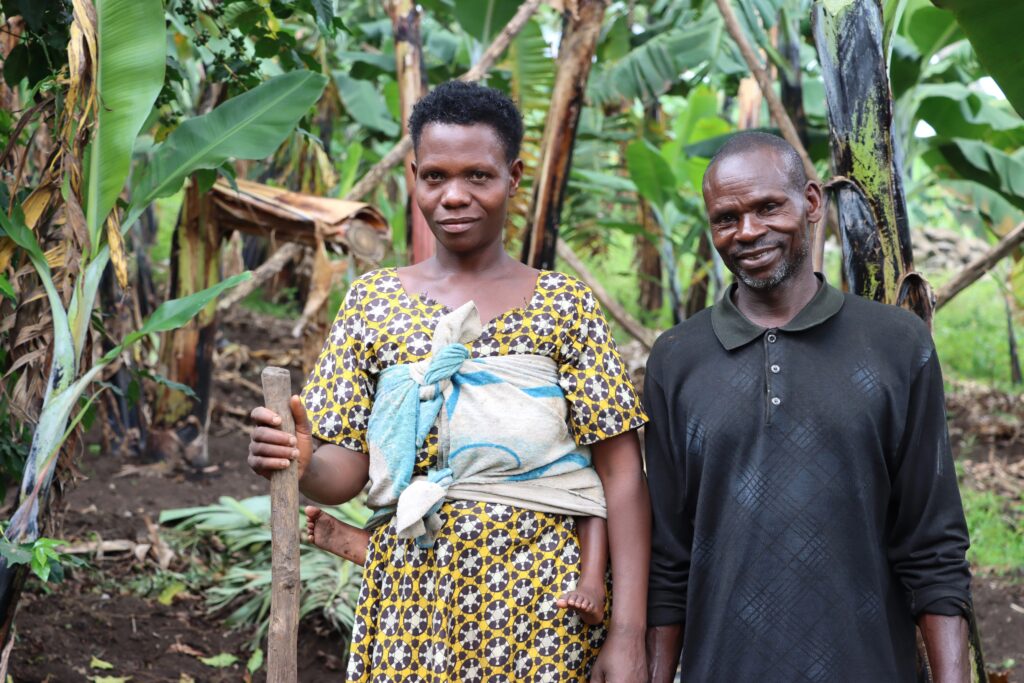
These methods, combined with imprecise plant spacing and poor management of weeds and pests, yielded just enough food, with little left to sell for income. But as their family grew, so did their needs.
The opportunity for Wilson and Margaret to increase their income came through the Building Resilience and Inclusive Growth of Highland farming systems for rural Transformation (BRIGHT) project, which empowers smallholder farmers with climate-smart agronomic practices, market linkages, and access to affordable, agriculture-specific financial services.
Drawn by the potential to boost production and income, the couple joined the project’s training sessions.
“We were trained in household planning and visioning, as well as improved agronomic practices like crop diversification, trench digging to retain water and prevent soil erosion, crop spacing, fertilizer application, and post-harvest handling,” Wilson explained.
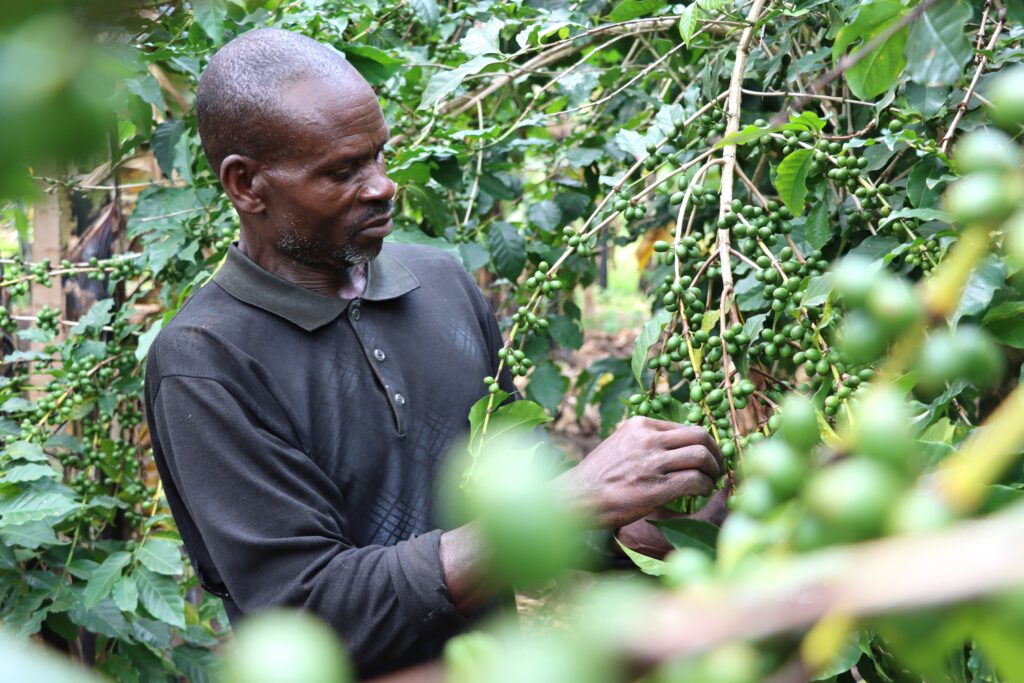
After completing the training, the family developed a household vision, which included plans to revive their garden and assign roles to each family member. They introduced several new crops to their garden, which had previously been limited only to potatoes, to sell for increased income, and they established a kitchen garden to ensure year-round access to nutritious food.
Wilson described how the family practices their vision together: “We dedicate the first five hours of each day to our garden. I plant; [Margaret] weeds. I spray the pests, she irrigates. When the children are home, they help with harvesting and post-harvest handling. Because we work together, our family is happy and motivated to achieve our vision.”
The fruits of their labor are evident. Their garden is divided into well-maintained sections: towering banana plants with mulched bases and water conservation trenches; fruit trees heavy with mangoes, pawpaws, and avocados; coffee plants tended with care; and a kitchen garden with beans, tomatoes, and eggplants. Every corner is weed-free, organized, and flourishing.
Margaret noted, “Ever since we improved our agronomic practices, we harvest all year round, one crop at a time. Our yields have increased and so has our income.”
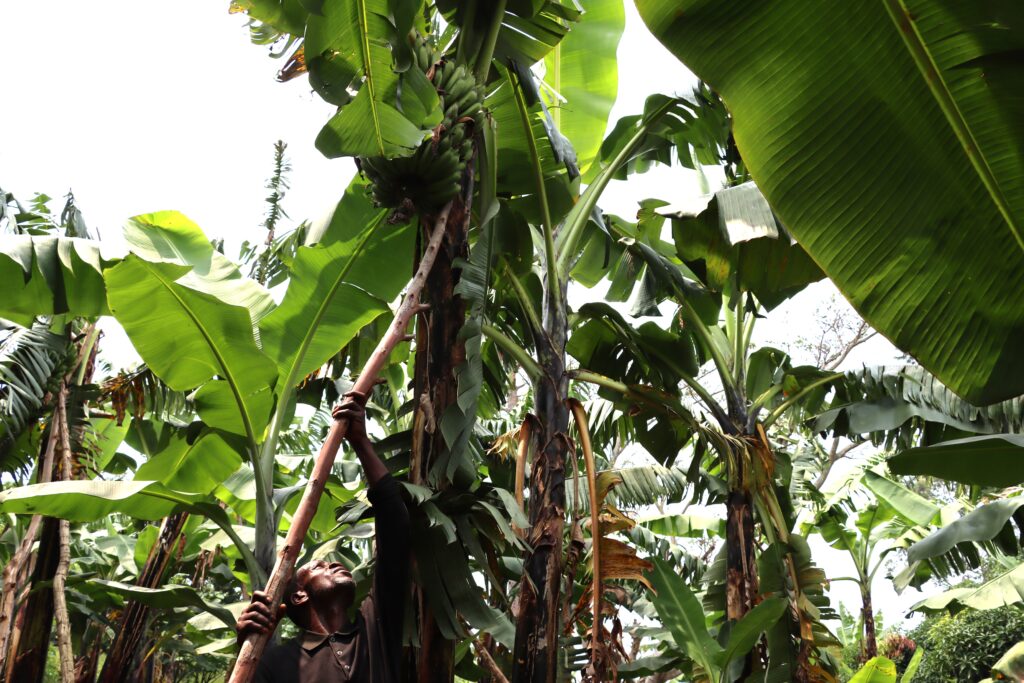
Wilson and Margaret have further improved their income through another BRIGHT initiative that encouraged participants to form groups to market produce collectively. “Alongside other farmers, we formed the Balokole Banana Farmers Group, through which we bulk and sell to banana offtakers, increasing our market access and profitability,” Wilson stated.
The family’s annual income has more than doubled from 3 million Uganda shillings (approximately U.S. $870.53) to 6.7 million (approximately U.S. $1,944.19). With it, they send their children to school, and they are saving to buy three more acres of land in the next year.
Wilson and Margaret’s household is among the 106,560 smallholder households empowered by the BRIGHT project to strengthen their resilience, boost their agricultural production, increase their food and nutrition security, and improve their income.
Farmers like Wilson and Margaret are contributing to Uganda’s Vision 2040 and Fourth National Development Plan ambitions to commercialize and monetize agriculture, while also advancing global efforts toward ending poverty and hunger under the United Nations Sustainable Development Goals 1 and 2.
Their success stands as a reminder that when farming families thrive, communities move closer to a food-secure future.
The Building Resilience and Inclusive Growth for Highland Farming Systems for Rural Transformation (BRIGHT) project, funded by the Netherlands Ministry of Foreign Affairs through the Embassy of the Kingdom of the Netherlands, seeks to build the resilience capacity of farm households and farming systems in Uganda to increase income and food and nutrition security of all farmers and transform households from subsistence to more market-oriented in Kigezi, Mount Elgon, and Rwenzori regions. The project is being implemented by the International Fertilizer Development Center (IFDC) in cooperation with Agriterra, the Uganda Ministry of Agriculture, Animal Industry and Fisheries (MAAIF), the National Agricultural Research Organization (NARO), district local governments, and private sector partners.




